The Everest Base Camp Trek is a renowned adventure that beckons travelers to the heart of the Himalayas. Over 15 captivating days, trekkers embark on an unforgettable journey, marveling at the majestic peaks and seeing vibrant Sherpa culture. From the scenic flight to Lukla to the breathtaking views of Mount Everest from Kala Patthar, this challenging trek offers a unique blend of natural wonders and cultural insights. With a commitment to responsible travel, the experience is designed to inspire awe and respect for the fragile mountain environment. But beyond the stunning landscapes, there’s a deeper allure that compels many to take on this epic adventure.
Key Points
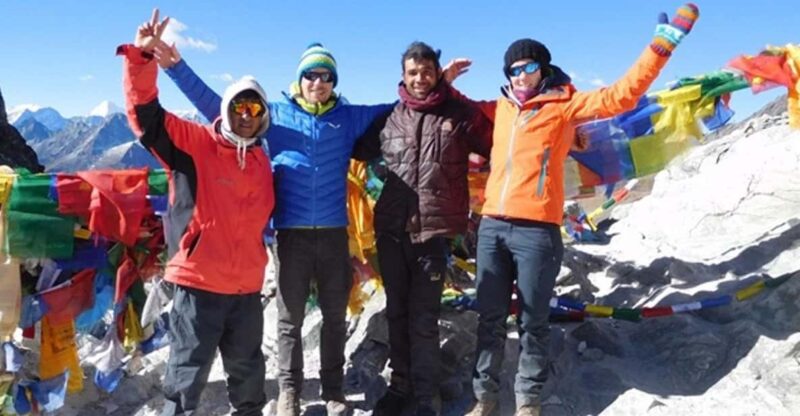
- The Everest Base Camp Trek is a 15-day meticulously planned itinerary that offers a challenging adventure through the breathtaking Himalayas.
- Trekkers can explore Mount Everest, experience vibrant Sherpa culture, and traverse diverse landscapes, including forests and glaciers.
- The trek is considered challenging due to high altitudes and demanding terrain, requiring physical fitness, acclimatization, and preparation.
- The trek includes airport pickup/drop-off, domestic flights, all meals, lodging, guide services, and permits, with a focus on responsible travel and sustainability.
- The trek is suitable for small to medium-sized groups, with departure dates available throughout the year, particularly in the spring and autumn seasons.
Overview and Pricing
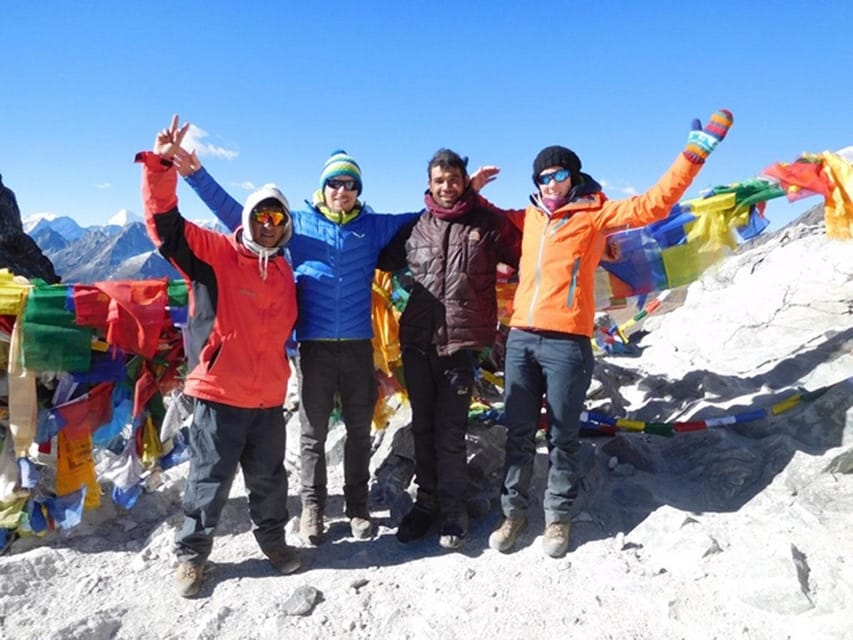
The Everest Base Camp Trek offers an enticing opportunity for adventurous travelers, priced at $2,065.00 per person.
Flexibility is a key feature, with a reserve now and pay later option available. Customers can book with confidence, thanks to the free cancellation policy up to 24 hours in advance for a full refund.
This trek is valid for 119 days, providing ample time for planning and preparation.
Whether you’re seeking a challenging adventure or a once-in-a-lifetime experience, the Everest Base Camp Trek delivers an unparalleled journey through the breathtaking Himalayas.
Ready to hit more trails? More hiking adventures we feature in Pheriche
Itinerary and Experience
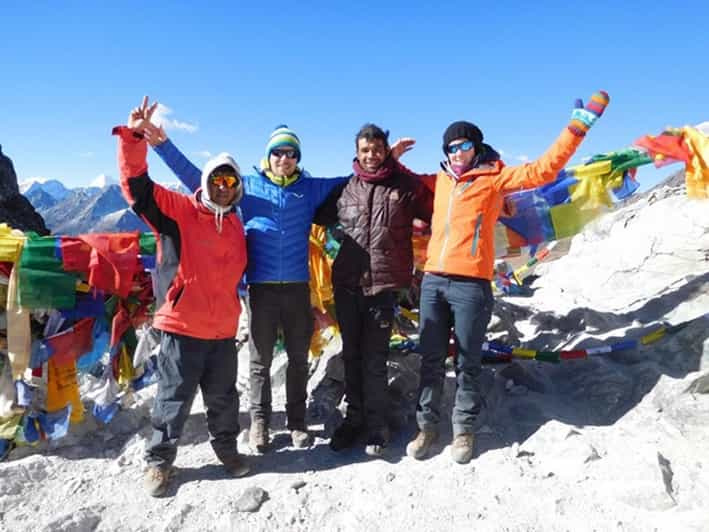
The Everest Base Camp Trek encompasses a meticulously planned 15-day itinerary, taking adventurers on a captivating journey through the heart of the Himalayas.
The trek begins with a scenic flight to Lukla, followed by a steady ascent to Phakding and Namche Bazaar for acclimatization. Trekkers then journey to Tengboche, Dingboche, and Lobuche, before reaching the iconic Everest Base Camp.
Along the way, they’ll traverse rhododendron forests, yak pastures, and glaciers, while seeing Sherpa culture and witnessing the daily prayers of monks.
The trek culminates with a hike to Kala Patthar, offering unparalleled views of the world’s highest peak, before descending back to Lukla and returning to Kathmandu.
Highlights and Cultural Insights
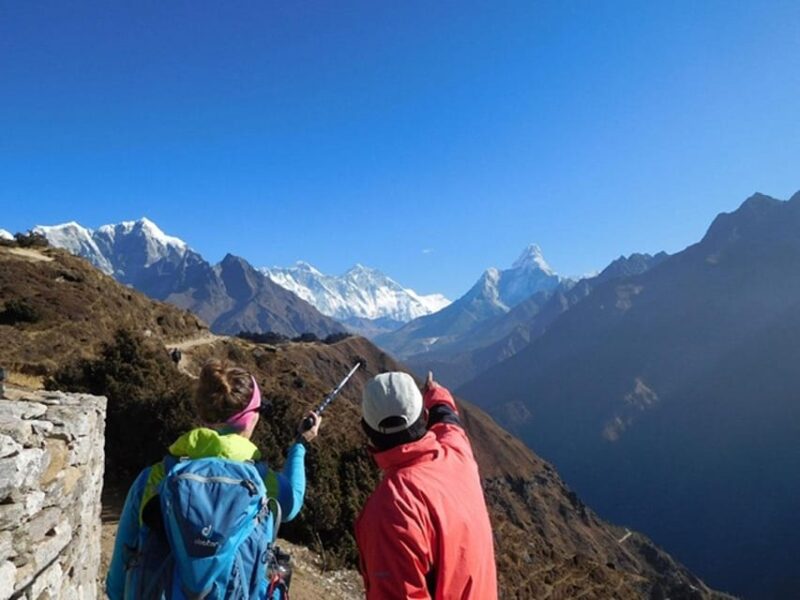
Exploring the world’s highest peak, Mount Everest, is just one of the many captivating highlights of the Everest Base Camp Trek.
Trekkers also experience the vibrant Sherpa culture, with opportunities to witness traditional village life and Buddhist monasteries.
The trek traverses diverse landscapes, including rhododendron forests, yak pastures, and dramatic glaciers.
Key cultural insights include:
- Observing the daily prayers of Sherpa monks in their serene monasteries.
- Taking in the rich heritage and customs of the Khumbu region.
- Appreciating the resilience and hospitality of the Sherpa people, who thrive in this challenging environment.
Inclusions and Exclusions
As part of the Everest Base Camp Trek package, the tour includes several essentials to ensure a comfortable and well-supported journey. This covers airport pickup and drop-off for international flights, domestic flights between Kathmandu and Lukla, and all meals, lodging, and guide services during the trek.
The package also includes permits for Everest National Park and TIMS, as well as a porter for every two trekkers. Plus, travelers will receive two nights of hotel accommodation in Kathmandu and a farewell dinner.
However, the tour excludes beverages, emergency evacuation costs, laundry, and tips for service staff, among other personal expenses.
More Great Tours NearbyImportant Information and Recommendations
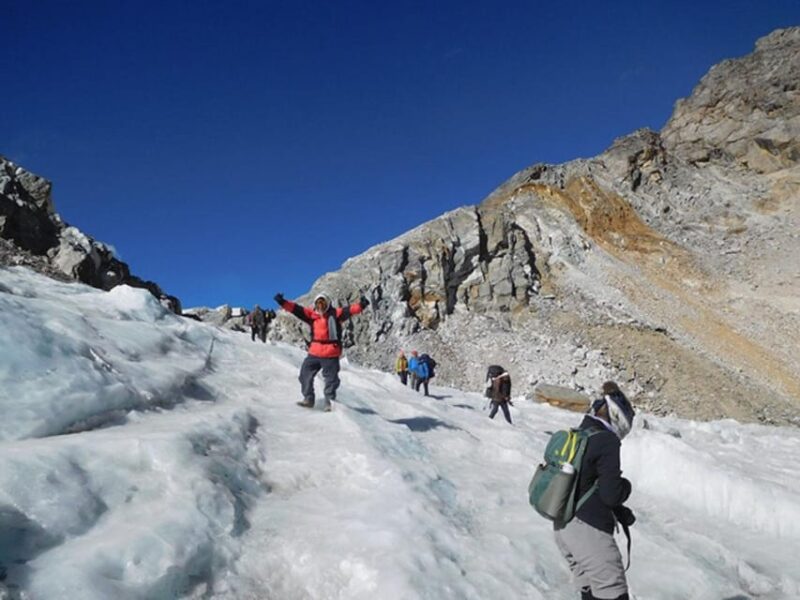
Not suitable for children under 2 years or people over 95 years, the Everest Base Camp Trek requires careful consideration of personal health and fitness level.
Recommended items include:
- Sunglasses to protect eyes from glare
- A change of clothes, towel, and camera to document the journey
- Sunscreen, cash, and a waterproof bag to safeguard belongings
Prohibited items are weapons, sharp objects, large luggage, alcohol, and drugs.
Throughout the trek, the focus is on providing the best lodges with basic facilities while maintaining fair business practices for customer satisfaction.
Trek Difficulty and Preparation
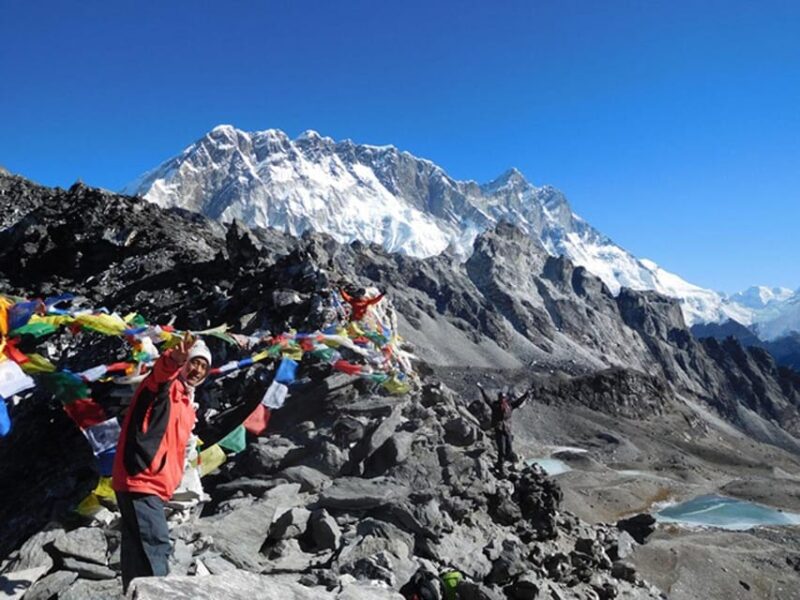
The Everest Base Camp trek is considered challenging due to the high altitudes and demanding terrain. Trekkers must be physically fit and acclimatized to handle the strenuous nature of the hike.
Proper preparation is essential, including training for cardiovascular endurance and strength. Hikers should also familiarize themselves with the necessary gear and equipment, such as warm clothing, sturdy boots, and trekking poles.
Altitude sickness is a significant concern, and trekkers must be aware of its symptoms and follow proper acclimatization protocols.
With the right mindset, training, and precautions, the Everest Base Camp trek can be an immensely rewarding experience, offering breathtaking views and a unique culture.
Group Size and Departure Dates
Everest Base Camp treks typically accommodate small to medium-sized groups, ranging from 2 to 12 participants.
The group size is intentionally kept small to ensure a more intimate and personalized experience, as well as to minimize the environmental impact on the fragile Himalayan ecosystem.
Departure dates for these treks are scheduled throughout the year, with the most popular times being during the spring (March-May) and autumn (September-November) seasons.
Some key benefits of the group size and departure dates include:
- Personalized attention from guides
- Reduced environmental footprint
- Flexibility in scheduling to accommodate individual preferences
Ultimately, these factors contribute to an unforgettable and sustainable Everest Base Camp trekking adventure.
Responsible Travel and Sustainability
Engaging in responsible travel and prioritizing sustainability are paramount considerations for those embarking on the Everest Base Camp trek.
The trek’s organizers are committed to implementing eco-friendly practices that minimize the environmental impact. This includes proper waste management, encouraging the use of renewable energy sources, and supporting local Sherpa communities.
Trekkers are advised to adhere to the Leave No Trace principles, disposing of waste properly and respecting the fragile alpine ecosystem.
By choosing this trek, travelers contribute to the conservation of the Everest region and the preservation of its unique cultural heritage.
Responsible tourism ensures that the beauty and serenity of this iconic destination can be enjoyed by future generations.
Frequently Asked Questions
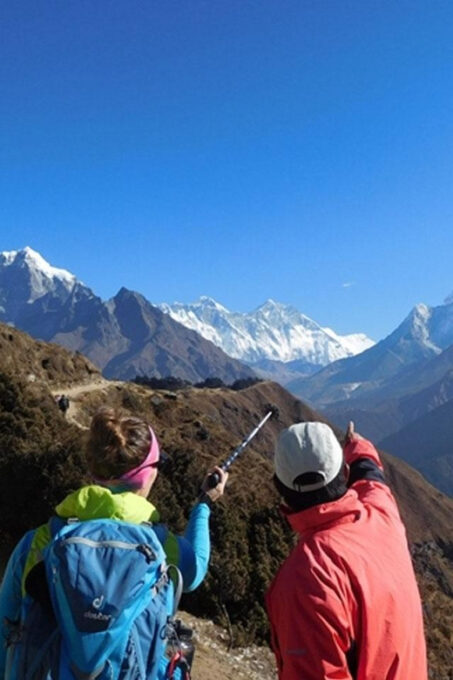
What Is the Best Time of Year to Do the Everest Base Camp Trek?
The optimal time to undertake the Everest Base Camp trek is typically during the spring (March-May) or autumn (September-November) seasons, when weather conditions are milder and skies are clearer, offering the best views of the Himalayas.
What Kind of Fitness Level Is Required for the Everest Base Camp Trek?
The Everest Base Camp trek requires a good level of physical fitness. Trekkers should be able to walk for 5-7 hours per day on uneven terrain at high altitudes. Prior hiking experience is recommended, but determination and a positive attitude are essential.
Can I Book This Trek for a Private Group or Family?
You can book the Everest Base Camp Trek for a private group or family. This allows for a more personalized experience and flexibility in scheduling. Many operators offer private group trekking options to cater to your specific needs.
Are There Any Vaccination or Medical Requirements for the Everest Base Camp Trek?
There are no specific vaccination requirements, but travelers should consult their healthcare provider for recommendations on routine vaccinations. Fitness and acclimatization are crucial, and travel insurance covering medical emergencies is highly recommended for the Everest Base Camp trek.
What Happens if I Get Altitude Sickness During the Trek?
If one experiences altitude sickness, the guide will promptly assess the situation and arrange proper medical care. This may involve descending to a lower elevation or, in severe cases, emergency evacuation to ensure the trekker’s safety and well-being.
Recap
The Everest Base Camp Trek offers an unparalleled adventure in the Himalayas. With breathtaking views, vibrant cultural experiences, and a commitment to responsible travel, it’s a journey that challenges and inspires. Thorough preparation and an open mindset are essential, as the trek demands physical stamina and adaptability. Ultimately, the Everest Base Camp Trek promises an unforgettable experience that leaves a lasting impact on those who undertake it.
You can check availability for your dates here:More Hiking & Trekking Tours in Pheriche
More Tour Reviews in Pheriche
Not for you? Here's more things to do in Pheriche we have recnetly reviewed
- 2 Best Guided Tours In Pheriche
- 3 Best Tours In Pheriche
- 5 Best Helicopter Flights And Tours In Pheriche
- 17 Best Hiking And Trekking Tours In Pheriche
- Everest Base Camp Trek 14 Days
- From Lukla: 10 Day Everest Base Camp With Kalapatthar Trek
- Everest Base Camp With Kalapatthar Guided Trek 12 Days
- From Lukla: 10 Day Everest Base Camp With Kalapatthar Trek
- Kathmandu: 12-Day Everest Base Camp Trek
- From Kathmandu: 12DAY Everest Base Camp Trek
- From Lukla: 11 Day Everest Base Camp With Kala Patthar Trek
- Everest Base Camp Trek- 14 Days
